News Analysis: Isolated more than ever, Trump is left in crisis by his own missteps

- Share via
WASHINGTON — Seldom in his 3½ years in the Oval Office has President Trump appeared so alienated from so many as he has this week.
His decision to invoke a military response to nationwide protests against police brutality — symbolized by the move Monday to gas mostly peaceful protesters in a park across from the White House to clear the way for a staged photo outside a church — appears to have been a fateful miscalculation.
The incident has created a deep rift between the White House and the Pentagon, and drew an extraordinary rebuke from Trump’s former secretary of Defense, James N. Mattis. In an essay, the widely admired retired four-star Marine Corps general accused the president of making a “mockery of our Constitution.”
Images of a widening perimeter of fences and concrete barriers that the administration has erected in a several-block area around the White House, as federal agents and troops patrol key intersections, have only deepened the sense of Trump as an isolated, beleaguered figure.

On Thursday, Sen. Lisa Murkowski (R-Alaska) told reporters on Capitol Hill that she was “struggling” with whether she could support Trump in the November election.
Mattis’ comments, she said, were “true, honest, necessary and overdue.”
“I felt like perhaps we’re getting to the point where we can be more honest with the concerns that we might hold internally and have the courage of our own convictions to speak up,” Murkowski said.
Publicly, her colleagues have not gone that far. Republican senators Thursday mostly tried to deflect questions about Mattis or express sympathy with Trump.
“It’s just difficult for him. You’re in that bubble and particularly this president” who has battled against what he sees as a hostile bureaucracy since taking office, said Sen. Ron Johnson (R-Wis.). “Who do you trust?”
Some defended Trump. Sen. Lindsey Graham of South Carolina went on Fox News to chide Mattis for agreeing with the “liberal media” and “buying into a narrative that I think is quite frankly unfair.”
But Republican strategists with wide contacts in the party say the events of the last few days have had a dramatic impact on Trump’s prospects.
“It feels like a pivot point. It feels like an inflection point,” said Michael Steel, who was a top aide to then-House Speaker John A. Boehner (R-Ohio) and veteran of three GOP presidential campaigns.
“The stunt at the church, combined with Mattis — there are going to be a thousand more twists and turns between now and Nov. 3,” he said. But “there’s a good chance that when the history of this campaign is written, this week will be seen as a benchmark. Mattis is a pretty big canary in the coal mine.”
Ed Rogers, a top White House aide to former President George H.W. Bush, said the week’s events “speak to a sense of presidential dysfunction.”
Trump “has a bad relationship with Congress, a bad relationship with most governors, a bad relationship with most business organizations. And now his own military is having to pause, gasp and say, ‘Say what?’” he said. “What does dysfunction look like?”
Trump’s growing isolation has elected leaders both at home and overseas shunning him.
He had hoped to convene the leaders of the other major industrial democracies for a Camp David summit this month to highlight his message that the U.S. was returning to normal after the economic shutdown caused by the COVID-19 pandemic.
German Chancellor Angela Merkel scuttled those plans Saturday, announcing she would not attend. She cited the continued pandemic for her decision, which came the day after Trump said the U.S. would pull out of the World Health Organization, the United Nations agency responsible for international public health.
On Friday, Trump plans to visit Maine, where advisors hope he can eke out a single electoral vote in November because of a state law that divides Maine’s electors by congressional district.
The state’s Republican senator, Susan Collins, facing a tough reelection and trying to convey an image of independence, has let it be known that she plans to be elsewhere. The state’s governor, a Democrat, on a conference call this week with other governors asked Trump not to come.
In public polls, as well as in surveys conducted by his own campaign, Trump trails his presumed Democratic opponent, former Vice President Joe Biden, in the major battleground states.
Polls released Thursday by Fox News found Trump down 4 percentage points in Arizona and an eye-popping 9 points in Wisconsin, both states he won in 2016. And those surveys took place before this week’s protests and Trump’s reaction had fully unfolded.
Stronger evidence of potential trouble for Trump comes from the campaign’s spending decisions so far, which largely defend turf that he won handily in 2016.
America First Action, the super PAC allied with Trump’s campaign, announced Thursday that it would begin advertising in several media markets that he dominated in the last campaign, including Grand Rapids, Mich., and Erie and Wilkes-Barre, Pa.
Voter dissatisfaction with Trump’s pandemic response puts him on defense in Iowa, a state he won by a wide margin in 2016
Nationwide, Trump trails Biden by 8 percentage points in the average of polls maintained by the Real Clear Politics website. That’s twice the size of Hillary Clinton’s margin at this stage in 2016.
“If Trump loses, there will be certain signposts along the way. There will be Charlottesville, his comments in Helsinki, and the Lysol moment. And Monday night,” said David Axelrod, former campaign and White House advisor to President Obama.
“He just completely misread the moment and behaved in a way that was so antithetical to norms and reason that it will create a lasting memory,” he said.
“There’s still 140 days left or something, and so who knows what events will intervene between now” and election day, Axelrod added. But, “as we sit here today on June 4 the picture is pretty dark for Republicans and Trump, and the only caveat is it’s June 4.”
Democrats, having seen their expectations turned upside down on election day in 2016, are now preternaturally superstitious about Trump’s ability to stage a comeback. Even so, party strategists believe they could not only win back the White House, but also control of the Senate this fall.
Republicans, once confident of keeping their Senate majority in the fall election, now fear Democrats have a fresh advantage as the coronavirus crisis has reshaped campaigns.
Trump is “just appealing to his base,” said former Senate Majority Leader Harry Reid of Nevada. “He’s got a lot of ground to make up.”
An increasing number of Republican strategists fear that is true. Trump allies argue that if the economy rebounds in the fall and the coronavirus does not stage a major comeback, the president will benefit from a brighter public mood. Others, however, point to signs such as Biden’s surging ability to raise money online as early warnings that the Democratic ticket will be tougher than Trump and his allies had counted on.
The problem Trump faces grows out of the central choice he made at the outset of his administration to govern as the leader of his tribe, not the full nation.
Unlike other presidents who won narrow victories, he has made few efforts to broaden his backing, and those only fitfully. The administration has assessed almost all decisions with an eye toward how they will be received by Trump’s base.
The rest of the public has responded accordingly: Unlike all his predecessors since the start of modern polling, Trump has not had a day in office in which even half the American public approved of his work, according to hundreds of public and private polls.
“The head of state function requires the ability to empathize with all aspects of American life, with all walks of American life, all groups in American life,” said Timothy Naftali, the historian and former head of the Nixon Library.
“The leader is supposed to remind people about why we are together, what it is about the American experiment that, for all its flaws, is worth preserving. He won’t, and I have to conclude he can’t at this point. You have a black hole at the center of American leadership at the moment, and that’s a catastrophe in the making.”
Still more crises may lie ahead for Trump this month. Any day, for example, the Supreme Court is expected to issue a ruling on his effort to repeal protections for so-called Dreamers, immigrants brought to the U.S. illegally as young children.
A loss would represent a major rebuke. A win might be more problematic.
It would leave Trump with the choice of moving ahead to deport hundreds of thousands of young people in the face of what would almost surely be massive resistance, or pulling back and disappointing a key part of his political base, which favors immigration restriction.
With Trump reeling from multiple crises and already reaching for military force as a tool to regain a sense of control, scholars worry about what may come next.
Trump’s photo op with a Bible in front of St. John’s church after the gassing of protesters Monday “encapsulated a lot of the things authoritarians do to get to power and stay in power,” said Ruth Ben-Ghiat, a New York University historian who studies authoritarianism.
Now, she said, Mattis’ speaking out represents the “elite defection” that often occurs when an authoritarian leader appears to be faltering. “They probably know it’s just going to get worse,” she said. “That’s where the inflection point comes.”
Times staff writers Noah Bierman, Jennifer Haberkorn, Janet Hook, Chris Megerian and Eli Stokols contributed to this report.
More to Read
Get the L.A. Times Politics newsletter
Deeply reported insights into legislation, politics and policy from Sacramento, Washington and beyond. In your inbox three times per week.
You may occasionally receive promotional content from the Los Angeles Times.












